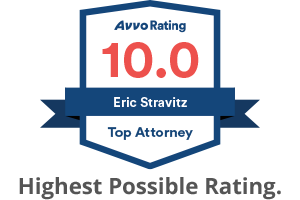AND SKILL TO GO THE
DISTANCE








If you have been injured through someone else’s negligence, you need a trial lawyer. Contact Eric at 240-467-5741.
Insurance companies behave differently when dealing with unrepresented people than they do with seasoned personal injury lawyers. For example, they typically have different teams of claims adjusters to deal with people who are unrepresented by a lawyer and those who are. Adjusters trying to resolve claims with unrepresented people may play psychological games (like acting like an injured person’s best friend) to get them to do things not in the person’s interest, such as:
There are many reasons. First, important evidence may be lost or improperly preserved. Second, without hiring a lawyer, you may make critical and avoidable mistakes that can torpedo the value of your case. Eric will counsel you to avoid those mistakes. Third, having an attorney exclusively on your side will reduce your stress level. Fourth, in an auto case Eric may need to have your vehicle examined to see if there was a product failure or a road or accident scene photographed to determine if there was a defective road condition. This could also apply to the scene of a slip or trip and fall. There are many others reasons that Eric would be happy to discuss with you.
The law has become incredibly complicated since Eric graduated from GW Law School in 1991. While it is certainly possible that a lawyer who handles some combination of personal injury, criminal defense, divorce, bankruptcy or other types of cases could do a good job for you, the odds of the lawyer maximizing the value of your personal injury case increase if he or she is familiar with the latest tactics of insurance companies and their lawyers, and is steeped in cutting edge tactics in handling, litigating, and trying personal injury cases. Eric is such a lawyer.
Some lawyers simply do not go to court. Others will file a lawsuit for you if they cannot settle your case, but they don’t have the skills or confidence necessary to handle the lawsuit or don’t want to try cases, so they settle claims and lawsuits cheap. Insurance companies are very sophisticated, they have armies of lawyers at their disposal. They will know if your lawyer does not litigate or try cases. They will likely low ball these lawyers.
You will get Eric, an award-winning, experienced, personable trial lawyer with over 25 years of experience. Not a paralegal. Not another lawyer in his office. Not an associate attorney who lacks litigation and trial experience.
Eric charges a contingency fee. This type of fee is a percentage of the overall amount of money (i.e., “recovery”) in a particular case. Thus, if there is no recovery, there is no fee and you don’t owe Eric or his law firm any money. The fee itself—in other words, the percentage of overall recovery that Eric charges—depends on the type of case (auto crash, premises liability, premises security, or medical malpractice).
Case expenses will be paid by Eric’s law firm throughout the lifespan of the case. If there is a recovery in the case, Eric’s firm will be reimbursed out of the settlement funds. In the early stages of a case those expenses mainly involve fees for police reports, ambulance reports, and medical records. These expenses will increase if a lawsuit needs to be filed. Unless the case will be handled in a Maryland District Court (cases filed in these courts tend to have less expenses that most other courts), the bulk of the expenses from a lawsuit will involve court filing fees, process server fees, court reporting company fees, expert witnesses’ fees. Case expenses will naturally increase if a case needs to be tried to secure a fair result. Eric strives to keep the case expenses as low as he reasonably can. Unlike some firms he does not charge for phone calls, faxes, scanning or copying, unless the copying or scanning job is too large to be accomplished in house.
This depends on the type of case, but there are a few things that will typically happen: First, if it is the type of case that involves an insurance company, Eric will put the insurance company on written notice that he represents you. He will also instruct that company not to contact or speak to you other than under specific circumstances (such as, in a crash case, to resolve your property damage claim). Second, Eric will immediately seek to secure any physical evidence. Third, if applicable, Eric will get photographs of your injuries. Fourth, Eric will order any police report of the circumstances that led to your injuries. Fifth, if applicable, Eric will order your ambulance and hospital reports and bills related to the incident. Sixth, Eric will get photographs of the incident scene. Seventh, in some cases, Eric may take or arrange recorded statements to be taken of any eyewitnesses (assuming they agree to them). Eighth, Eric will ask you to contact him once you complete your medical treatment. Ninth, Eric will order your medical records and bills after you inform him that you have been discharged from the medical care you were receiving as a result of the incident. Tenth, if the person or company that injured you had insurance, Eric will put together a “demand package” and send it to the insurance adjuster. The adjuster’s often take around 30 days to begin discussing the case with Eric after receiving the package. After Eric hears back from the adjuster, he will then negotiate with the adjuster in an effort to settle your case. Eric will keep you informed about the progress of the negotiations and will consult with you about what amount will settle the case. Ultimately, he will seek your authority (permission) to settle the case for a specific amount. If the insurance company offers that amount, Eric will settle the case. If it does not, and you do not want to settle your case for what they are offering, your alternative will be to give Eric permission to file a lawsuit on your behalf. It should be noted that there are some insurance companies that are so unreasonable that Eric may recommend bypassing the demand package/negotiations phase of the case (in other words, simply filing a lawsuit without attempting to negotiate with the insurance company).
This can be a complicated issue. Generally, Eric will pay them out of your gross recovery. If there is no recovery, a health insurance lien will disappear.
Eric will prepare a “Disposition Sheet” showing how the settlement funds will be distributed. In fact, he generally asks his clients to review and sign that Disposition Sheet before he distributes the funds.
Absolutely not!
Although there are variations, depending on where your lawsuit is filed, you can generally expect the following:
We will prepare written discovery called “interrogatories” (written questions that must be answered by the defendant under oath) and a “request for production of documents” (this device allows us to get important documents and photographs from the defendant, and his or her lawyer and insurance company).
We will then hire a private process server to hand-deliver a copy of your lawsuit to each defendant in your case along with interrogatories and a request for production of documents.
Typically, the defendant’s insurance company will hire a lawyer for the defendant. This lawyer will then file an “answer” to our lawsuit and will send it to us along with “interrogatories” and a “request for production of documents.”We will work with you to answer these “interrogatories,” which you will have to sign under an oath to tell the truth. After consulting with you, we will prepare a response to the each defendant’s request for production of documents (you need not sign this response).
Once written discovery is completed, and sometimes beforehand, the parties (parties means the plaintiff(s) and the defendant(s)) will submit to a “depositions.” A deposition is an interview conducted in a lawyer’s office, under oath, with a court reporter present to record all of the questions and answers. I always meet with my client before his or her deposition takes place. About a week after a deposition is completed, the court reporter will send the lawyers a transcript of it. Typically, we will depose the defendant and the defense attorney will depose our client (the plaintiff). Sometimes, depending on tactical considerations, the attorneys will also depose fact and expert witnesses. It should be noted that depositions rarely occur in cases filed in Maryland District Courts and Virginia General District Court. Additionally, these Courts do not conduct jury trials. Instead, they have Judge only or “bench trials.”
Once written discovery and all depositions have been completed, the parties to the case may explore settlement by simply talking among themselves, or they may agree to use various methods of Alternative Dispute Resolution or ADR. These methods are discussed below. One Court in which Eric handles cases, D.C. Superior Court, orders the parties in most cases to “mediate” (see below for an explanation of the mediation process) their lawsuit. Of course, if both sides are willing, the parties can discuss settlement at any time, even during trial.
Although Eric prepares all of the firm’s cases with trial in mind, once it becomes clear that a case will not settle, he will prepare more specifically for trial. For example, for a jury trial, he will prepare: (1) any pretrial statements requested by the Court, (2) “voir dire” (the written questions we would like the potential jurors to be asked in jury selection), (3) the “exhibits” that he intends to show the jury; (4) jury instructions (instructions that he would like the Judge to read to the jurors at the end of the case); (5) any memoranda of law he believes are necessary to advise the Judge about our positions in the case; (6) any motions in limine he believes are necessary to keep the jury from considering improper evidence or to confirm that he can use certain evidence that may be in question; (7) one or more “verdict sheets,” which are the documents on which the jury renders its verdict, and, of course, (8) an opening statement, direct examinations or cross-examinations of witnesses, and a closing argument.
Lastly, in some cases tried to a jury or judge, it may be necessary to file or respond to “post-trial motions” or an “appeal.”
ADR comprises various ways of resolving cases without actually going to trial. Some examples include: mediation, arbitration, and neutral case evaluation. These will be discussed further below. ADR can take place either before or after a lawsuit is filed. Because of the time, money, and uncertainty involved in trying cases to juries, the use of ADR has significantly increased nationwide during the past decade.
Mediation involves assembling the parties to a claim or case in one or more conference rooms and having the mediator (usually a lawyer or retired judge) talk to each side together, and then privately, in an attempt to settle a case. Sometimes the mediator will not put the different sides in a case together in the same room. The mediator typically has no power to force a settlement or resolution of a case, but rather, attempts to push both sides together until the case settles. In Eric’s experience, if the participants are motivated to settle the case, mediation can be an effective tool in resolving cases. If the participants are forced to mediate or are not motivated to settle the case, it will likely be unsuccessful.
Arbitrations are essentially less formal, time consuming, and expensive trials held in a conference room with an arbitrator (usually a lawyer or retired judge) who reviews documents submitted by the parties’ lawyers, hears testimony from witnesses, hears arguments from the lawyers, and then renders a decision. Whether that decision resolves a case will depend on whether the parties agreed to make the arbitration binding (the decision will resolve the case) or non-binding (it won’t resolve the case unless the parties agree with the result). Eric almost never agrees to a non-binding arbitration because he views them as a waste of time. Often, in order to give some certainty to the parties, binding arbitrations involve the use of a “high/low agreement.” This means that if the arbitrator’s decision is less than the amount of money agreed upon as the “low,” our client will get the “low.” Conversely, if the arbitrator’s decision exceeds the amount of money agreed upon as the “high,” our client will receive the “high.” Typically, if the parties’ work out a high/low agreement, it is not disclosed to the arbitrator.
These involve the parties’ submitting information about the case to a “neutral case evaluator” or “neutral” (usually a lawyer or retired judge), who then tells the parties what he or she believes the case is worth. The idea is that if one or both parties have an unrealistic view of the value of a case, the neutral can educate that party about the true value of the case and foster settlement.
I hired Eric after being injured in a rear-end collision in Prince George’s County. There wasn’t much visible property damage to my car from the collision. Because of this, Geico refused to offer any money for my medical bills, lost wages or the effect the collision had on my life. After rear-ending...
"Eric, Thank you so much for all of your work on my case. I am very pleased with the arbitration result and can't thank you enough. I plan on recommending you to everyone I know! Take care." Sincerely,
"Dear Eric, It has been a pleasure being your client. I really appreciate your patience and willingness to explain complicated legal jargon in layman's terms. May you both have continued success always." - Sincerely, Corenthia P., Prince George's County, Maryland
Client Bill of Rights
